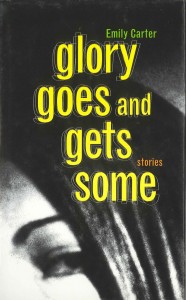As the title suggests, Glory “gets” things. She gets more punishments than prizes, though, and together her list of experiential acquisitions is long: She gets expelled from all the good schools in New York City. She gets thrown out of CBGB (literally). She gets “dope-sick.” She gets fucked in the ass by guys whose last names she doesn’t know. She gets HIV. She gets sent to rehab in Minnesota. She gets sober. She gets married.
It’s only those last three events—and only in retrospect— that lend Glory’s life any appearance of ascent, and even those come with a lot of caveats. Glory Goes and Gets Some is, I guess, a success story, but it’s hardly redemptive.
Glory starts out—and mostly remains—both morbid and mordant. As a child, she “felt that things wanted [her] dead.” And as an adult she calls wanting to live a “piddling ambition” and then compares it to “longing for a career in data processing.” Glory’s a self-described PWV (Person With A Vagina), and her “initial-cluttered life” is profuse with self-sabotage — which for the reader means a brassy tongue and a good deal of swagger.
The stories can stand alone, but they’re so good that they’re better read all together, and most likely in one sitting. In conjunction, they do a better job than anything else I’ve read of chronicling the causes of total destitution, which to most readers would seem like a foreign fate. How does that happen to a person? Who’s failed and how many times? What precautions have been botched? Which bridges have been burned? Carter handles the material honestly and informally. The stories are more apostrophe than soliloquy. That we’re addressed as “you” isn’t gimmicky or cloying; if someone’s talking about their chronic disease, addiction, and near-constant anguish, they might as well get familiar.
The candor isn’t burdensome, mostly because Carter’s so funny. The bawdy humor makes it easy to ignore the quality of the writing—and then to be cowed by its ease. Carter’s figurative language is minimal and usually fruit-filled and lapidary (“The temptation to act badly dangled before me like an irradiated apple, emitting a sick and luminous glow”). Bleary eyes are “dusty grapes,” an embarrassed child “sparkl[es] quietly like a candied plum,” and her husband is an “uncut jewel… who could spell ‘phlegm’ if he had to.” But the whimsy is low-key. Usually, Glory’s giving it to us straight: “I was the most useless and helpless of all things,” she announces, “a rich girl with no money whatsoever.”
Carter’s themes are some of the hardest to write about without resorting to cliché, but Glory Goes and Gets Some is 100% aphorism-free, which is especially impressive knowing that she (and Glory) have been forced to talk about her feelings with professionals in institutionalized settings for years. The closest Glory gets to uncomplicated self-diagnosis is when she admits that her earliest experiences taught her to think it was glamorous to be self-destructive. That ruinous crossing of nurture and nature is best experienced in the second-degree intimacy of a book—allowed in, but not implicated. She makes bad drugs sound good, and near-fatal mistakes seem necessary. Glory comes across like the best person you’d never want to be.
The distinction between Glory and her creator is fine and almost pointless to parse. Emily Carter has endowed her fictional alter ego with a shared biographical past, and presumably most of her own insights. But considering the book’s content—and its looking back point of view—it’s easy to see why Emily Carter would resist straight-memoir. Carter wants us to understand Glory as a creation, not for artistic reasons but for human ones. She’s done more than deflect her own worst moments onto a made-up mirror image of herself. Glory Goes and Gets Some was surely therapeutic to write, but it’s also a testament to Carter’s own agency. She didn’t get her book, she wrote it.



